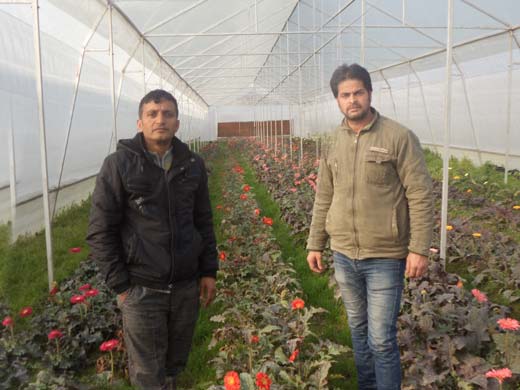At the peak of militancy, Zakir Hussain Qadri would sell home appliances door to door in Punjab. As things improved, he returned and struggled his way up to become one of the major flower cultivators in south Kashmir. Suhail A Shah meets the entrepreneur who eyes big in floral boom.

During the Amarnath Land Row, while Kashmir valley was under an economic blockade, a Jammu bound Tata Sumo, carrying floriculture produce, was smashed by a mob in Chenani town of Udhampur district of Jammu, along the Srinagar-Jammu National Highway. The floriculture produce laden in the vehicle was destroyed as well by the mob.
The produce (flower stems and bulbs) was the first, after a yearlong toil, of a small floriculture project (Dati Nag Agritech) started by two childhood friends in Shangus village of south Kashmir’s Islamabad district, about 74 Kilometres from summer capital Srinagar.
The incident, however, did not deter Zakir Hussain Qadri and his friend and business partner Hilal Ahmad Shah.
To export their produce they took the aerial route which nonetheless did not prove to be easy as well.
At the peak of the agitation in 2008, their produce was often unpacked multiple times during the trip to the airport in Srinagar and the rampant corruption at the airport proved to be handful as well.
The duo however, braving all odds took their business forward to what can safely be called unexpected heights.
A sleepy village located on Achabal-Chatpal road, Shangus has a substantial number of government employees and most of them serve in either Army or Police.
Forty-year-old Zakir Hussain Qadri, a soft spoken man, was no exception given the standards already set in the village. He was inducted in the Indian Army as a clerk, in 1989 soon after he passed his 10+2 from the Government Higher Secondary in Utteresoo, a village adjacent to Shangus.
Qadri was sent for training to Army’s Materials Management College in Jabalpur city of Madhya Pradesh; however he resigned from Army soon after he completed the training in 1993.
“I worked as a door to door sales man for a Multi National Company, before I was offered the job of a Sales Representative of a Pharmaceutical Company in 1996,” said Qadri while showing this reporter his newly constructed high tech poly-houses.
Six years and several promotions later, Qadri decided to call it a day at the Pharmaceutical Company he was working with, packed his bags and returned to Kashmir.
“I resigned as the Regional Manager (Northern India) of the company and returned to Kashmir in 2002,” Qadri said.
The idea, according to Qadri, was to start something of his own in Kashmir and generate employment while earning money.
For four years Qadri held some odd jobs in Kashmir while he consulted people and started to chalk out a plan for the future.
“It was one of my friends from Delhi who told me about flower cultivation and the business prospect of it,” Qadri says. It appealed him immediately and he started working on the project.
It had been more than half a decade since Hilal Ahmad Shah, a tall 36 year old with blonde hair, had dropped out of the college. When Qadri discussed his project with Shah, he was more than eager to join in.
Hilal works as an on-ground expert in the Partnership concern, while Qadri looks after the marketing and other official aspects of the trade.
The way ahead, however was not easy. The government attention towards entrepreneurship development was minimal, the partners say.
“Banks were also reluctant to invest,” said Hilal, “After a lot of hard work and putting our houses on mortgage, we did manage to get a loan of 10 Lac Rupees from the bank.”
The problem was that the bank did not put a moratorium period on the loan, the partners maintain.
“We had some land in the village, 5 Kanals to be precise, and we started to construct poly-houses,” said Hilal, ‘But before we could cultivate anything and get it sold the Bank started sending notices for the repayment.”
Apart from the bank loan the duo had invested 10 Lac Rupees more, which they say were provided by the respective families and the work on the project started in 2007.
The produce was ready by the summer of 2008. The export however proved to be an uphill task in wake of the volatile situation in Kashmir.
“The first produce, destroyed in Udhampur, was worth about 3 Lac Rupees,” said Qadri, “After that we started to ferry our products to airport in Srinagar during nights.”
Qadri says that police played a very negative role during those days. They were accused of carrying Cannabis and were made to unpack their produce quite often.
“We somehow managed to get through that bad patch and not only did we sustain, we are doing exceptionally well,” he says.
Qadri and Hilal have closed down their old farm and have last year leased some 25 Kanals of land in the outskirts of the village.
Spread over more than 5000 square feet of land, 7 Poly-Houses have already been erected at the leased land.
The Poly-Houses have been constructed with the state of art technology, imported from the US and Israel.
Heaters will be the only thing that these poly-houses will be short of, compared to the poly-houses in developed countries.
“We are aiming at getting the heaters within a decade’s time, hopefully,” said Qadri.
While the old facility had the capacity to produce around 25,000 to 30,000 flower stems, the new one will be capacitated to produce more than 1,50,000 stems per season.
Thus far the partners have not applied for a bank loan, “We have invested back whatever we had earned as of now,” they say.
“This new project named Kashmir Agro Farmers is worth One Crore Rupees. We are compiling a project report and we will be approaching several agencies for the funding process,” Qadri says, “We will moreover be investing equity of 60 Lac Rupees, which we have managed to save since production commenced.”
The Bank and the National Technology Mission (NTM) will be their main sponsors.
The Products and the Market:
The products in the trade are numerous; however for now Qadri and Hilal are concentrating upon Lillieum stems and a flower called Gerbera, used for ornamental purpose.
Within a year, Qadri maintains, they will be able to produce more than 1 Lac Lillieum stems and 24,000 Gerbera flowers.
“We will also be cultivating 40,000 stems of rose and more than 2000 of Honesty Flower, also known as the Money Plant,” said Hilal.
Moreover they are importing Lilliem bulbs from Holland and after propagating (treating them in soil less culture) export them to parts of India.
“We hope to increase the number of bulbs we import. Hopefully we will increase them from 1 Lac to 5 Lacs within a year’s time,” said Qadri.
The bulb is imported from Holland at a landing cost of 4 Rupees per bulb and then it’s exported on a price of 12 to 20 Rupees, per bulb, depending upon the size.
However Qadri says, that they will need to import the bulb for a maximum of 3 years, after which they can cultivate it here.
India has got a huge potential for flower consumption and rough estimates suggest that the flower industry in India worth several hundred crores.
“Every major flower grower in India exports more than 10 Lac bulbs of Lillieum every year for propagation,” Qadri said, “We hope to be a small part of this huge industry.”
There is a lot to do however. Qadri and Hilal as of now have a share of not more than 5 per cent in the flower exports from Kashmir.
“With this new facility functional, we are aiming higher,” said Hilal. The duo hopes to tap a big chunk of the market in the coming years.
Qadri believes that the market is huge and Kashmir has got the suitable environment for flower cultivation and bulb propagation.
Qadri hopes that more and more youth come forward and look to make it a full time profession, given the immense potential for growth on offer.
“There is a huge market for Marigold flowers, given their importance in Hindu religion. If youth can come forward and cultivate these flowers the business can be huge with minimal investment and efforts,” said Qadri.
Pros and Cons:
The major issue flower growers in Kashmir face is proper training. “The weeklong training I received at the Entrepreneurship Development Institute (EDI) in Pampore was a formality,” said Qadri.
He says that he got to know about the trade once he started cultivation; however the major issue still remains that of pest control.
In absolute absence of expert advice from the Sheri-Kashmir University of Agriculture Science and Technology (SKUAST), Qadri says, he was compelled to hire an expert from New Delhi.
“We once planted more than 25000 stems of Oriental Lilies and they developed a disease,” Qadri said, “After repeated pleas to the SKUAST authorities nobody came to our rescue.”
As a result they were forced to uproot the stems, incurring a loss of more than 6 Lac Rupees.
“And pest control still remains an issue,” said Qadri.
However he maintains that he has over a period of time learned other tricks of the trade.
“I plant radish and cucumber during the winters,” said Hilal, “This serves as crop rotation and keeps the fertility of the soil intact.”
Some things are learned in the field but there remain a flurry of issues like irrigation, temperature control and proper guidance on rotation of crops; the duo says, need expert advice from government agencies.
Moreover the delay on certain things from the government agencies, Qadri and Hilal say, hampers the working in one way or the other.
“Like we have applied for a power connection and it has been months now but no forward movement seems to be taking place regarding this,” said Qadri, “Electricity is very important for the proper functioning of the poly-houses.”
He alleges callousness on part of the government agencies.
“The Babus at the government offices make sure that our work is delayed just to extract money,” Qadri said.
He says that the government should understand that entrepreneurs are the new employment generators and for the good of the people they should be treated a little different.















